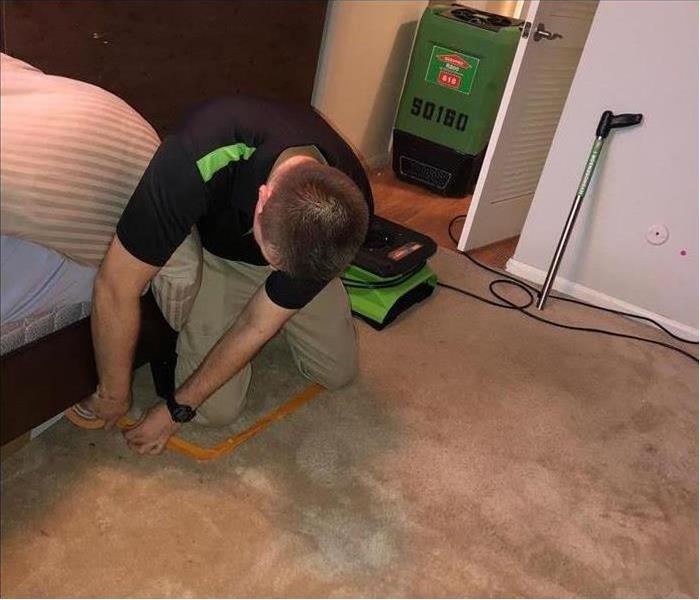Cleaning Up Water Damage In Your Home
11/1/2022 (Permalink)
Water Damage Tips
Water damage is a serious problem that can strike at any time and cause costly, long-term damage to your home. If you've ever had to deal with water damage in your house, you know how quickly things can go from bad to worse if you don't act fast. So, what steps should you take after a pipe breaks or an appliance starts leaking? Here's what you need to know about cleaning up water damage in your home!
Water damage is a serious problem that can strike at any time. Is your home prepared?
Have you ever wondered what to do if you suspect water damage? If you have, then this expert guide will help.
What to Do if You Suspect Water Damage:
- Check the ceiling and walls for signs of moisture or discoloration. If they're wet or showing signs of mold, it's time to call in professionals like our team at SERVPRO. We'll assess your situation and let you know how best to proceed.
- Never use hot water extraction methods on your own; these methods aren't safe for untrained individuals who don't have access to the proper equipment and training required for their execution.
If a pipe in your house breaks, turn off your water supply at the main valve right away to stop further water damage.
Here are some tips from the pros on how to deal with a water emergency in your home:
- Turn off your water supply. If a pipe in your house breaks, turn off your water supply at the main valve right away to stop further water damage.
- Turn off the heater. If you have a gas-heated home, it's important to shut off or reduce power (if possible) to any heaters that may be affected by the flooding.
- Shut down electrical appliances in affected areas. It’s often not safe for you or anyone else to be around electrical equipment during cleanup because of potential electrical hazards like live wires and short circuits – so let professionals handle those repairs.
- Don't turn on any faucets until after they're dried out completely; this will help prevent any bacteria growth inside of them while they're still wet.
Don't hesitate to call a professional for help. It's better safe than sorry when it comes to water damage.
When you have a water damage issue, it's tempting to try and tackle things yourself. But it's important to realize that you may not be able to tell the extent of the damage or what kind of long-term effects there might be from water lingering in your home. It's better to be safe than sorry by calling a professional who can help resolve the problem for you and make sure everything is resolved properly.
Professional water damage cleanup is the way to go after any major leak or flood situation.
After a flood or leak, it's important to get the job done as quickly and efficiently as possible to prevent further damage. Professional water damage clean-up services are equipped with the tools and knowledge necessary to remove all your worries about the cost or time it will take to fix your property. If you choose not to hire a professional service, you may end up spending much more money on repairs than you would have by calling in the pros.
It is also important that you take care of any mold problems before they happen so that they don't spread throughout your home or office space. If left unchecked, mold can cause serious health problems such as respiratory issues and even death in some cases!
We hope this article has been helpful, and we wish you the best of luck in keeping your home safe from water damage. If you have further questions or concerns about any aspect of water damage repair, please contact us.






 24/7 Emergency Service
24/7 Emergency Service
